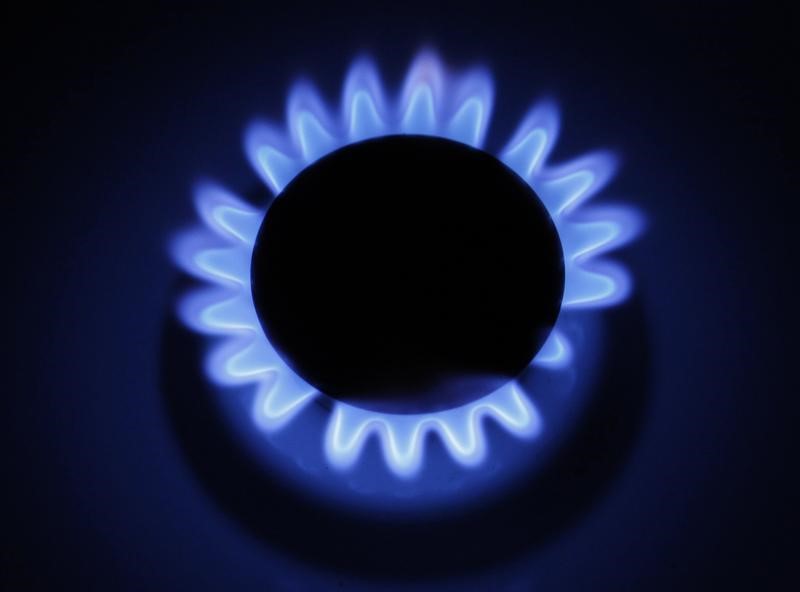
© Reuters.
NG
+0.27%
Add to/Remove from Watchlist
Add to Watchlist
Add Position
Position added successfully to:
Please name your holdings portfolio
Type:
BUY
SELL
Date:
Amount:
Price
Point Value:
Leverage:
1:1
1:10
1:25
1:50
1:100
1:200
1:400
1:500
1:1000
Commission:
Create New Watchlist
Create
Create a new holdings portfolio
Add
Create
+ Add another position
Close
By Barani Krishnan
Investing.com — The gas bears have decided to cut the bulls some slack.
Natural gas futures on the New York Mercantile Exchange’s Henry Hub held above the key $3 support on Thursday despite the U.S. government reporting a rare weekly storage build for inventories of the heating fuel.
The front-month February gas contract on the hub settled up about 2 cents at $3.69 per mmBtu, or metric million British thermal units, after the Energy Information Administration reported an 11-bcf, or billion cubic feet, storage build for the week ended Jan. 6. It gained as much as 27 cents, or 7.4%, rallying to a session high of $3.94.
The increase in gas inventories, which came during what is being described as the warmest start to a winter in 20 years, came in at the high-end of forecasts by some industry analysts, who expected a build of under 10 bcf for last week. Fourteen analysts polled by Reuters had, in fact, anticipated an average draw of 13 bcf for last week.
Despite the inventory build, February gas posted an intraday low of just $3.61 on Thursday, holding above Wednesday’s trough of $3.42 — which marked a new bottom since June 2021.
Sensing Thursday’s extremely bearish storage report, some market participants had expected the last vestiges of $3 support to vanish from the front-month gas contract this week, to reintroduce the $2 trading levels not seen since May 2021. After a near 50% price collapse over four weeks that took the front-month to below $3.50 from the August peak of above $7, that development would have not been surprising.
Yet, as indicated by some technical chartists following natural gas, the oversold market may go the other way — which it did upon the release of the latest storage report.
“The storage build we saw today, rare as it may be for a winter season in gas, had been baked into the cake after the 50% price collapse over the past four weeks,” said John Kilduff, founding partner at New York energy hedge fund Again Capital. “So, we’re holding onto to $3 for now and could go a little higher, should it get a little colder next week, compensating some of the downside we’ve had lately.”
After explosive upward price action for most of 2022 from weather extremities and a supply squeeze caused by political and other disruptions to Russian gas output in the aftermath of the Ukraine invasion, natural gas futures suddenly collapsed last month. The change has been attributed primarily to unseasonably warm winter temperatures that have left both the U.S. and European heating markets sufficiently supplied.
Exports of LNG, or liquefied natural gas, have also been tamped down since June with the shutdown of the Freeport liquefaction facility in Texas, which has idled about 2 bcf, or billion cubic feet, of gas per day. That is independent of what’s happening on the weather front.
Weather forecasters say that other than a transient burst of chilly temperatures aimed at the Southeast region of the United States this coming weekend, overall mild temperatures don’t look to change until at least January 22.
That means it will be another 10 days before the longer-range weather models expect a resumption of the bitterly cold Arctic winds that are typical at this time of the year. Once in place, the continuation of that winter weather may linger well into February throughout the central and eastern regions of the country.
Based on current chart patterns in U.S. gas, several support points appear to hold the market at above $3, says Sunil Kumar Dixit, chief technical strategist at SKCharting.com.
Adds the chartist:
“The probability for $2 pricing is quite low for now, from a technical perspective. At the most, I see the current bearish streak extending to the 100-Month Simple Moving Average of $3.29, if we take another leg lower from Wednesday’s low of $3.42.”
“Otherwise, the weekly chart suggests a potentially bullish double bottom formation, which will, of course, require confirmation from price action reversal.”
“If gas rebounds from those support areas and makes a sustained break above $3.77, followed by $4.17, we’ll get that confirmation. At that point, the rebound targets will be $4.77 and $5.67.”
Source: Investing.com





























